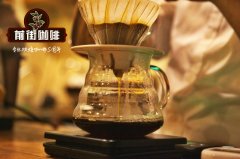What are the brands of Chinese boutique coffee? Do you know how much real boutique coffee costs?

Professional coffee knowledge exchange More coffee bean information Please pay attention to coffee workshop (Weixin Official Accounts cafe_style)
Do you know how much that cup of coffee cost this morning?
If you drink instant coffee from a supermarket, farmers can earn $1.45 (NT$43) a pound, while brand name roasters can earn $4.11 (NT$123), according to the United Nations Organization for Intellectual Property.
If you go to a chain coffee shop and buy freshly brewed coffee, the beans usually emphasize fair trade or sustainability certification, so farmers can earn twice as much, about NT$86 a pound, and the store sells them for about NT$255.
But if you go to the so-called boutique coffee shops that have sprung up in Europe and the United States in recent years and are becoming popular around the world, then coffee farmers 'income will instantly surge to NT$115. Of course, the shops responsible for roasting and brewing can also sell better prices, exceeding NT$500 per pound of coffee.
For older consumers, 500 yuan for a pound of coffee was simply an astronomical price. No matter what, they probably wouldn't drink that expensive stuff. But times are changing. For young office workers and millennials in Europe and America, boutique coffee shops not only have their appeal, but also represent a new consumption concept and values.
The point is that these young upstarts don't see a final price of hundreds of dollars for a cup of coffee, but farmers in the region can earn three times their income for the cup of coffee they buy, improving their lives.
The so-called "ethical buying" and "ethical consumption" have become popular all over the world in recent years, especially in metropolitan areas such as London, New York and Los Angeles. The Attendant, a boutique coffee shop in east London, has a sign hanging outside its door that says the central spirit of this consumer concept: "Change the world, start with coffee."
The younger generation of consumers grew up in an abundant and globalized environment. Consumption is no longer just a hunger for them, but a display of value and an idea. Therefore, the emphasis on not purchasing a large number of low prices, and producers profit sharing of small boutique coffee can be a single breakthrough, one by one open, break through the strong marketing of multinational brands, find the space for dialogue with customers.
For example, a Ugandan coffee bean sold by The Attendant is not a traditional coffee producing area, but the boss found a good quality coffee bean source, first educated the employees internally, telling them that this coffee bean can help Ugandan farmers obtain stable economic sources and improve local unrest. After this product concept was conveyed to consumers through the shop assistants, it quickly received echoes.
"I like to buy ethically sourced coffee because it makes you feel better," says Amy, a marketing manager.
While some believe ethical consumption is just a fad and gimmick, the two biggest coffee brands in the world, Nestle and JAB, have rushed to buy boutique coffee shops in recent years, proving that even traditional multinationals have discovered that the world is changing.
Important Notice :
前街咖啡 FrontStreet Coffee has moved to new addredd:
FrontStreet Coffee Address: 315,Donghua East Road,GuangZhou
Tel:020 38364473
- Prev

Recommended by the world boutique coffee brand-does the hand brewing of blue bottle coffee belong to boutique coffee?
Professional coffee knowledge exchange more coffee bean information please follow the coffee workshop (Wechat official account cafe_style) to boutique coffee, coffee shop Apple Store known as the Blue bottle Coffee (Blue Bottle Coffee), will be acquired by food giant Nestl (Nestl é) 68% stake, a market value of about US $500 million (about NT $15 billion), in addition to re-testing
- Next

The relationship between the third wave of coffee and boutique coffee the definition of boutique coffee is …...
Professional coffee knowledge exchange more coffee bean information please follow the coffee workshop (Wechat official account cafe_style) the first wave of coffee appeared in the early 20th century, the invention of instant coffee pushed coffee to the mass market
Related
- Detailed explanation of Jadeite planting Land in Panamanian Jadeite Manor introduction to the grading system of Jadeite competitive bidding, Red bid, Green bid and Rose Summer
- Story of Coffee planting in Brenka region of Costa Rica Stonehenge Manor anaerobic heavy honey treatment of flavor mouth
- What's on the barrel of Blue Mountain Coffee beans?
- Can American coffee also pull flowers? How to use hot American style to pull out a good-looking pattern?
- Can you make a cold extract with coffee beans? What is the right proportion for cold-extracted coffee formula?
- Indonesian PWN Gold Mandrine Coffee Origin Features Flavor How to Chong? Mandolin coffee is American.
- A brief introduction to the flavor characteristics of Brazilian yellow bourbon coffee beans
- What is the effect of different water quality on the flavor of cold-extracted coffee? What kind of water is best for brewing coffee?
- Why do you think of Rose Summer whenever you mention Panamanian coffee?
- Introduction to the characteristics of authentic blue mountain coffee bean producing areas? What is the CIB Coffee Authority in Jamaica?

